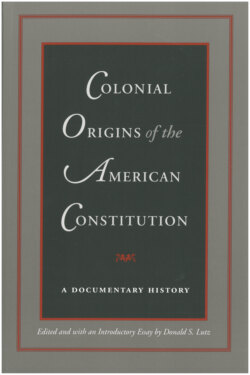Читать книгу Colonial Origins of the American Constitution - Группа авторов - Страница 11
На сайте Литреса книга снята с продажи.
Оглавление4
[Plymouth Oath of Allegiance and Fidelity]
1625
The Oath of Supremacy, begun by Henry VIII to break the power of the Roman Catholic Church, and the Oath of Allegiance, begun by James I in 1605, after the Gunpowder Plot, were both required by Charles I, who reigned from 1625 to 1649. The latter oath did not refer to the king as the head of the church and thus was more acceptable to the Puritans. The Charter of Massachusetts Bay gave the company liberty to admit new members on its own terms. The colony at Plymouth, however, was not, strictly speaking, a colony because it was outside of Massachusetts Bay territory and lacked its own charter. Plymouth took advantage of its position to avoid both the Oath of Supremacy and the Oath of Allegiance by writing its own oath, which did not mention the king but instead created allegiance primarily to the colony. In the absence of a document that explicitly created a polity, such as the Mayflower Compact, an oath such as this one became the covenantal basis for a “civil body politick,” as the Pilgrims put it, and effectively served as both a founding document and a means of naturalizing later arrivals to the colony. Here, as in other similar documents (9, 15, and 16, for example), we find an efficient use of a religious form to implicitly create a civil society, establish and underwrite its legitimacy, define citizenship, provide a means for adding new citizens later, and define a police power, while enunciating a political theory based on popular consent, political equality, and loyalty to the common good of the citizenry.
Text taken from Charles Evans, “Oaths of Allegiance in Colonial New England,” Proceedings of the American Antiquarian Society, n.s., 31 (April 13–October 19, 1921): 383. Text is complete except for the ellipsis inserted by Evans.
FORM OF OATH FOR ALL INHABITANTS
You shall sweare by the name of the great God ... & earth & in his holy fear, & presence that you shall not speake, or doe, devise, or advise, anything or things, acte or acts, directly, or indirectly, By land, or water, that doth, shall, or may, tend to the destruction or overthrowe of this present plantation, Colonie, or Corporation of this towne Plimouth in New England.
Neither shall you suffer the same to be spoken, or done, but shall hinder & opposse the same, by all due means you can.
You shall not enter into any league, treaty, Confederace or combination, with any, within the said Colonie or without the same that shall plote, or contrive any thing to the hurte & ruine of the growth, and good of the said plantation.
You shall not consente to any such confederation, nor conceale any known unto you certainly, or by conje but shall forthwith manifest & make knowne by same, to the Governours of this said towne for the time being.
And this you promise & swear, simply & truly, & faithfully to performe as a true christian [you hope for help from God, the God of truth & punisher of falshoode].1
FORM OF THE OATH GIVEN THE GOVERNOR AND COUNCIL AT EVERY ELECTION
You shall swear, according to that wisdom, and measure of discerning given unto you; faithfully, equally & indifrently without respect of persons; to administer Justice, in all causes coming before you. And shall labor, to advance, & furder the good of this Colony, & plantation, to the utmost of your power; and oppose any thing that may hinder the same. So help you God.
